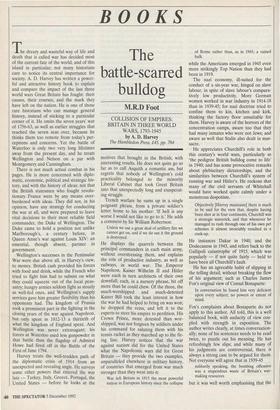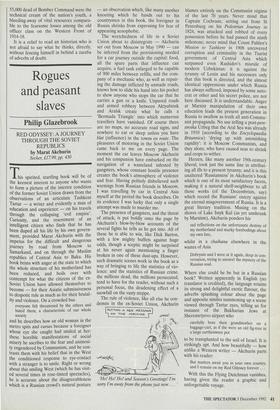BOOKS
The battle-scarred bulldog
M.R.D Foot
COLLISION OF EMPIRES: BRITAIN IN THREE WORLD WARS, 1793-1945 by A. D. Harvey The Hambledon Press, £45, pp. 784 he dreary and wasteful way of life and death that is called war has decided most of the current fate of the world, and of this island in particular; not many historians care to notice its central importance for society. A. D. Harvey has written a power- ful and attractive history book to explain and compare the impact of the last three world wars Great Britain has fought: their causes, their courses, and the mark they have left on the nation. He is one of those rare historians who can manage general history, instead of sticking to a particular corner of it. He omits the seven years' war of 1756-63, as well as earlier struggles that reached the seven seas over, because he thinks them too remote from today's per- ceptions and concerns. Yet the battle of Waterloo is only two very long lifetimes away from the present day, and he treats Wellington and Nelson on a par with Montgomery and Cunningham.
There is not much actual combat in his pages. He is more concerned with diplo- matic, economic, political and strategic his- tory, and with the history of ideas: not that the British statesmen who fought revolu- tionary France were by any means over- burdened with ideas. They did not, in his opinion, have any strategy for conducting the war at all, and were prepared to leave vital decisions to their most reliable field commander, the Duke of Wellington. The Duke came to hold a position not unlike Marlborough's, a century before, in Queen Anne's war against Louis XIV: an essential, though absent, partner in government.
Wellington's successes in the Peninsular War were due above all, in Harvey's view, to money. British cash provided his forces with food and drink, while the French who tried to fight him had to subsist on what they could squeeze out of the local peas- antry; hungry armies seldom fight as stoutly as well-fed ones, and Wellington's supply services gave him greater flexibility than his opponents had. The kingdom of Prussia took a prominent part in the fighting in the closing years of the war against Napoleon, but only spent in 1812-13 a thirtieth of what the kingdom of England spent. And Wellington was never extravagant; his forces at Waterloo used less gunpowder in that battle than the flagship of Admiral Howe had fired off in the Battle of the First of June 1794.
Harvey treats the well-trodden path of the diplomatic crisis of 1914 from an unexpected and revealing angle. He surveys some other powers that entered the war late — Turkey, Italy, Greece, Portugal, the United States — before he looks at the motives that brought in the British; with interesting results. He does not quite go so far as to call Asquith a romantic ass, but regrets that nobody of Wellington's cold practicality belonged to the minority Liberal Cabinet that took Great Britain into that unexpectedly long and exasperat- ing struggle.
Trench warfare he sums up in a single poignant phrase, from a private soldier's letter home to his mother: `If hell is any worse I would not like to go to it.' He adds a comment by Sir William Robertson:
Unless we use a great deal of artillery fire we cannot get on, and if we do use it the ground is destroyed.
He displays the quarrels between the principal commanders in each main army, without overstressing them, and explains the role of productive industry, as well as railways, in world war. The Emperor Napoleon, Kaiser Wilhelm II and Hitler were each in turn architects of their own downfall; each, in a nursery phrase, bit off more than he could chew. Of the three, the much-worshipped and much-detested Kaiser Bill took the least interest in how the war he had helped to bring on was won; he dropped the reins, and left it to the experts to steer his empire to perdition. His Crown Prince, more detested than wor- shipped, was not forgiven by soldiers under his command for saluting them with his tennis racket as they marched up to the fir- ing line. Harvey notices that the war against nazism did for the United States what the Napoleonic wars did for Great Britain — they provide the two examples, unparalleled elsewhere in military history, of countries that emerged from war much stronger than they went into it:
War left Britain in 1815 the most powerful nation in European history since the collapse of Rome rather than, as in 1945, a ruined hulk
while the Americans emerged in 1945 even more strikingly Top Nation than they had been in 1919.
The nazi economy, ill-suited for the conduct of a six-year war, hinged on slave labour, in spite of slave labour's compara- tively low productivity. More German women worked in war industry in 1914-18 than in 1939-45; for nazi doctrine tried to confine them to kin, kitchen and kirk, thinking the factory floor unsuitable for them. Harvey is aware of the horrors of the concentration camps, aware too that they had many inmates who were not Jews; and aware as well that Stalin also dealt in mas- sacre.
He appreciates Churchill's role in both this century's world wars, particularly as 'the pedigree British bulldog come to life' in 1940; and has some provocative remarks about plebiscitary dictatorships, and the similarities between Churchill's system of running war and Hitler's. He reckons that many of the civil servants of Whitehall would have worked quite calmly under a monstrous despotism.
Objectively [Harvey maintains] there is much to be said for the view that, despite having been shot at in four continents, Churchill was a strategic maverick, and that whenever he managed to rush through one of his own pet schemes it almost invariably resulted in a cock-up.
He instances Dakar in 1940, and the Dodecanese in 1943, and refers back to the Gallipoli catastrophe of 1915, which was popularly — if not quite fairly — held to have been all Churchill's fault.
He has an agreeable habit of slipping in the telling detail, without breaking the flow of his argument; such as Charles James Fox's original view of Consul Bonaparte:
In conversation he found him very deficient upon every subject; no powers or extent of mind.
Fox's complaints about Bonaparte do not apply to this author. All told, this is a well balanced book, with audacity of view cou- pled with strength in exposition. The author writes clearly, at times conversation- ally; none of his sentences needs to be read twice, to puzzle out his meaning. He has refreshingly few slips; and while many of his judgments are controversial, there is always a strong case to be argued for them. Not everyone will agree that in 1939-45
militarily speaking, the bombing offensive was a stupendous waste of Britain's war- making resources
but it was well worth emphasising that the 55,000 dead of Bomber Command were the technical cream of the nation's youth, a bleeding-away of vital resources compara- ble to the fearsome losses among the old officer class on the Western Front of 1914-18.
It is a relief to read an historian who is not afraid to say what he thinks, directly, without fencing himself in behind a zareba of adverbs of doubt.











































































 Previous page
Previous page